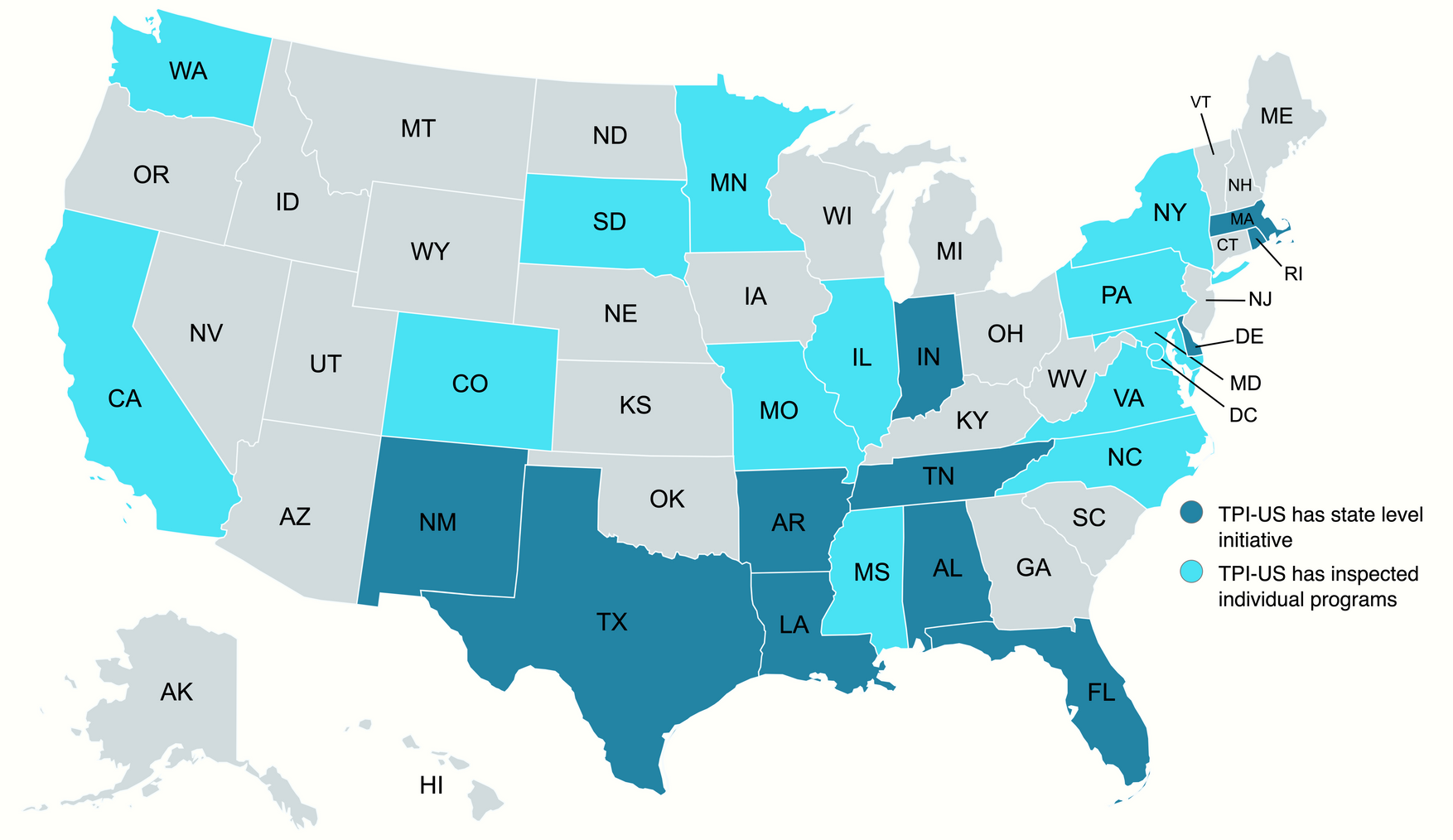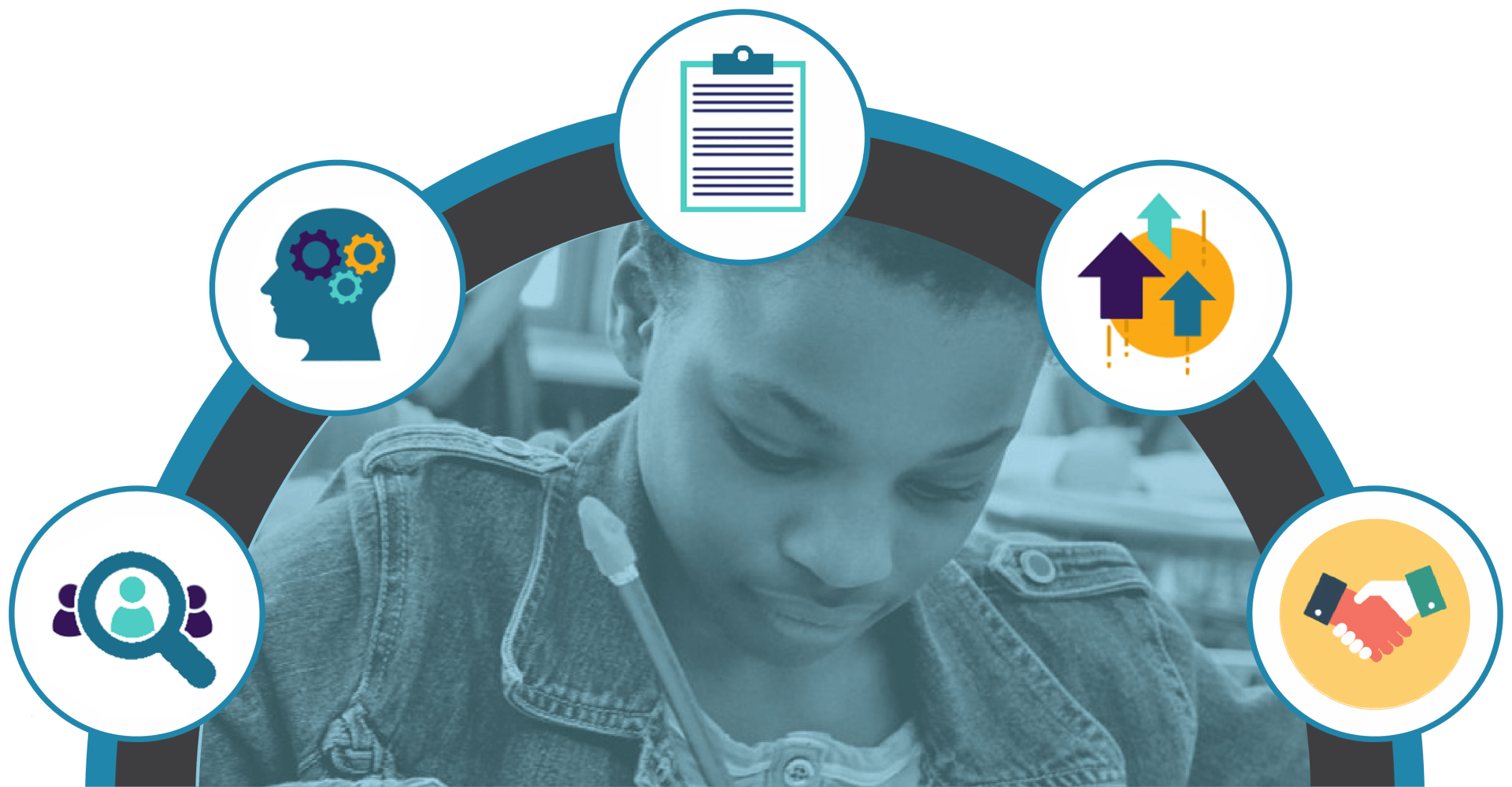With the goal of improving student learning, TPI-US reviews teacher preparation programs to determine how the programs can expand their promising practices and address areas of improvement.
This is
What We Do.
Where We've Worked
TPI-US has produced better learning outcomes for more than one million students.
Impact estimates are VERY conservative based on: 1) Only includes teacher candidates graduating the first year after inspection, 2) Only includes students taught in teachers’ first year - the ripple effect on succeeding groups of students would take this to well over one million students.
For more information on our initiatives,
please see here.
How We Do It
Each inspection includes a team trained by TPI-US. Teams observe program coursework, review data, and interview a broad cross-section of stakeholders including faculty, recent graduates, teacher candidates, school principals and district officials, and classroom mentor teachers. Inspection teams also observe candidates teaching to understand how well they are able to apply what they’ve learned in the program. A key feature of all observations is the impact of teaching on student learning during the observed lesson.
Transparency is a hallmark of the inspection process: program faculty and staff sit in on every inspection team discussion of evidence, with the chance to clarify or add to initial findings. On the final day onsite, the team lead summarizes findings about program strengths and areas for improvement, and discusses evidence behind each judgment. A written report to the program mirrors this discussion.
Leaders report benefitting from TPI-US’s objective feedback and actionable recommendations, leveraging the feedback as a catalyst for change that ushers in the next stage of continuous improvement and ongoing program self-assessment.
Program Inspections
Driving Continuous Improvement in Teacher Preparation
Teacher quality is the single most important school-based factor in student success. While schools may offer professional development for their teachers, the quality of a teacher’s initial preparation has lasting impacts on their effectiveness in the classroom. That’s why we focus on the quality of preparation that pre-service teachers receive. Since 2013, our inspection process has supported over 28,000 new teachers across 26 states, ultimately impacting more than 1,000,000 K-12 students.
Our inspections provide teacher preparation programs with independent, evidence-backed feedback that highlights strengths, identifies areas for growth, and sets the stage for lasting improvement. Before programs can truly improve, they need clear, evidence-based insights into what’s working and what needs to improve.
What We Do
- Every inspection is conducted by a team of trained reviewers who take a comprehensive 360-degree view of the program. This includes observing coursework, examining program data, and meeting with a wide range of stakeholders—faculty, graduates, candidates, school leaders, district officials, and mentor teachers. Teams also spend time in classrooms observing candidates teach, paying particular attention to the impact of instruction on student learning.
- At the close of each day, the inspection team conducts a verbal debrief of the day’s activities, observations, and collected evidence. In doing so, the team offers a transparent window into emerging trends and eventual findings. This openness encourages faculty and staff to participate in the process by clarifying details or providing context to emerging findings.
- At the close of the visit, the team’s lead inspector shares a summary of strengths and areas for growth, walking through the evidence that supports each judgment. Programs also receive a written report that mirrors this conversation and offers a clear roadmap for improvement.
Benefits of Program Inspections
- Accelerating Improvement
The TPI-US inspection process moves beyond compliance to shared responsibility in preparing future teachers. Rooted in quality improvement and guided by evidence-based practices, our inspections animate the belief that strong systems drive strong results. TPI-US provides clear, actionable recommendations to support program growth and enhance student learning. - Supporting Program Leadership
Objective, external feedback provides program leaders with a strong platform for decision-making. Inspection reports engage teams in the continuous improvement process, clarify priorities, and guide actionable steps to enhance program quality. - Informing States and Funders
Aggregated inspection data reveals patterns across multiple providers, helping states and philanthropies identify promising practices and guide policy decisions. No organization knows more about the quality of teacher preparation in the U.S. than TPI-US.
Our Commitment
We are proud to serve as a trusted partner in strengthening teacher preparation across the nation. With every inspection, our goal is simple: better-prepared teachers, stronger programs, and improved outcomes for K-12 students.
Learn more about our work →
info@tpius.org
Technical Support
Partnering for Program Improvement
At TPI-US, we recognize the value in helping EPPs translate inspection findings into actionable steps that drive meaningful program improvement. Cataloging a program’s strengths and areas for growth is a helpful first step, but many programs will also benefit from continued and tailored support throughout their improvement journey. Our technical assistance services provide evidence-based support to strengthen the quality of teacher preparation, ensuring that graduates are well-equipped to meet the needs of their students on day one.
Program inspections identify strengths and areas for growth. Technical assistance takes the next step: helping leaders, faculty, and partners turn findings into action.
What We Do
- Customized Support
We design technical assistance services to meet a program’s specific context and needs, aligning the unique findings from our inspections with evidence-based practices. - Capacity Building
We collaborate with faculty and leaders to develop knowledge and skills in areas such as curriculum design, literacy preparation, clinical practice, and program performance management. - Ongoing Guidance
Through check-ins, coaching, and follow-up support, we ensure that improvement is not a one-time event, but part of a continuous cycle.
Benefits of Technical Assistance
- Stronger Programs
Program improvement cannot be the sole purview of leadership; our technical assistance services are designed to distribute ownership for outcomes across an EPP, generating buy-in and a collective commitment to results. - Sustainable Improvement
Faculty and leaders build long-term capacity for evidence-based decision-making. Lasting improvement requires planning, collaboration, and measurement. By partnering with TPI-US, programs have the chance to systematize their efforts across an EPP, bolstering the durability of improvement efforts over time. - Aligned Stakeholders
Partnerships across programs, districts, states, and funders are strengthened around a shared vision of teacher preparation. Too often, partnerships between EPPs and external bodies exist in name only. At TPI-US, we’ve seen firsthand the impact of meaningful collaboration on the readiness of pre-service teachers and their eventual student outcomes. Technical assistance is designed to welcome the voices of stakeholders from across an EPP’s network.
Our Commitment
TPI-US is more than an evaluator—we are a partner. Through technical assistance, we walk alongside programs to ensure that every recommendation leads to meaningful change, and every change leads to better-prepared teachers and improved outcomes for students.
Learn more about our work →
info@tpius.org
Literacy-Focused Inspections
Closing the Gap Between Research and Practice
Too few teacher preparation programs equip new teachers with the knowledge and skills to apply the science of reading in the classroom. TPI-US inspections across 26 states show that more than 50% of programs’ literacy coursework needs significant improvement. Programs often fail to teach explicit, systematic instruction in phonemic awareness, phonics, fluency, vocabulary, and comprehension—leaving graduates unprepared for the realities of today’s classrooms.
Our literacy-focused inspections directly address this gap, ensuring that new teachers are prepared to help all K-12 students learn to read.
What We Do
- Observe Coursework & Training
We review syllabi and course materials, observe classes, and interview stakeholders to assess how well teacher candidates are prepared to design and deliver scientifically based reading instruction. Our observation protocols are based on the established body of research identifying effective literacy instruction and teaching practices, allowing trained inspection teams to delve into what truly matters. - Assess Candidate Practice
We observe teacher candidates in classrooms to determine whether they can effectively apply literacy training. It’s not enough to merely expose teacher candidates to scientifically based instruction; they must also be able to apply key skills in authentic environments while receiving high-quality feedback from highly trained professionals. - Provide Actionable Feedback
Like our traditional program inspections, programs receive clear, evidence-based recommendations that drive meaningful and continuous improvement.
Benefits of Literacy-Focused Inspections
- Better Prepared Teachers
Graduates enter classrooms ready to teach reading effectively from the very first day. A new teacher’s first year is difficult enough without having to learn effective literacy practices independently. By strengthening the quality of literacy preparation that teacher candidates receive, programs increase their initial effectiveness and boost K-12 student learning. - Reliable Data for Programs, States, and Philanthropies
The data collected through TPI-US literacy-focused inspections identifies how well teacher candidates are being prepared to teach K-12 students to read. Our inspections pinpoint strengths and performance gaps, providing programs, states, and philanthropies with reliable evidence to make informed investments and drive better results for K-12 students. - Catalyzing Partnerships
The flurry of interest around literacy has opened the door to new partnerships designed to boost K-12 students’ literacy success. Our literacy-focused inspections serve as a conduit for increased collaboration between programs, states, and philanthropies.
Our Commitment
Through literacy-focused inspections, TPI-US helps close the gap between research and practice. With every inspection, our goal is simple: teachers prepared to teach reading, and students prepared to succeed.
Learn more about our work →
info@tpius.org
Judgment Areas
Teams collect evidence to come to judgments in five areas:
Quality of Selection
The quality of a program's selection addresses its responsibility to select candidates that show potential to become successful teachers.
Quality of Clinical Placement, Feedback, and Candidate Performance
A program's quality of clinical placement, feedback, and candidate performance concerns the key elements of the final clinical experience in which candidates must apply the knowledge acquired through the program.
Quality of Program Partnerships
The quality of a program's partnerships addresses the community and K-12 partnerships that enable program candidates to enjoy authentic experiences.
Quality of Content Knowledge & Teaching Methods
This judgment area focuses on how well a program ensures teacher candidates acquire content knowledge and key teaching methods and skills needed to be an effective educator.
Quality of Program Performance Management
This examines whether and how program leadership—at all levels—utilize data to continually improve the quality of teacher preparation and outcomes for all teacher candidates.



